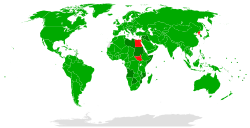Organization for the Prohibition of Chemical Weapons

OPCW logo
|
|

Member states of the OPCW (green)
|
|
| Formation | 29 April 1997 |
|---|---|
| Headquarters |
The Hague, Netherlands 52°05′28″N 4°16′59″E / 52.091241°N 4.283193°ECoordinates: 52°05′28″N 4°16′59″E / 52.091241°N 4.283193°E |
|
Membership
|
192 member states All states party to the CWC are automatically members. 4 UN Member States are non-members: Egypt, Israel, North Korea and South Sudan. |
|
Official language
|
English, French, Russian, Chinese, Spanish, Arabic |
|
|
|
|
Official organs
|
Conference of the States Parties Executive Council Technical Secretariat |
|
Budget
|
€71 million/year (2012) |
|
Staff
|
approximately 500 |
| Website | opcw.org |
The Organisation for the Prohibition of Chemical Weapons (OPCW) is an intergovernmental organisation, located in The Hague, Netherlands.
The organisation promotes and verifies the adherence to the Chemical Weapons Convention which prohibits the use of chemical weapons and requires their destruction. The verification consists both of evaluation of declarations by member states and on-site inspections.
The organisation was awarded the 2013 Nobel Peace Prize because it had, with the Chemical Weapons Convention, "defined the use of chemical weapons as a taboo under international law" according to Thorbjørn Jagland, Chairman of the Norwegian Nobel Committee.
The activities of the OPCW and its core organisational structure are described in the Chemical Weapons Convention (whose members are all in OPCW). The principal body is the conference of states parties, which normally is convened yearly, and in which all countries participate and have equal voting rights. Countries are generally represented in the Conference by a permanent representative to the organisation, which in most cases is also the ambassador to the Netherlands. The conference decides on all main topics regarding the organisation (for example, taking retaliation measures) and the convention (approving guidelines, imposing retaliating measures against members). The Executive Council is the executive organ of the organisation and consists of 41 States Parties, which are appointed by the Conference on a 2-year term. The Council amongst others oversees the budget and cooperates with the General Secretariat on all matters related to the convention. The Technical Secretariat applies most of the activities mandated by the Council and is the body where most of the employees of the organisation work. The main activities of the OPCW are performed by the verification and the inspection division.
...
Wikipedia
